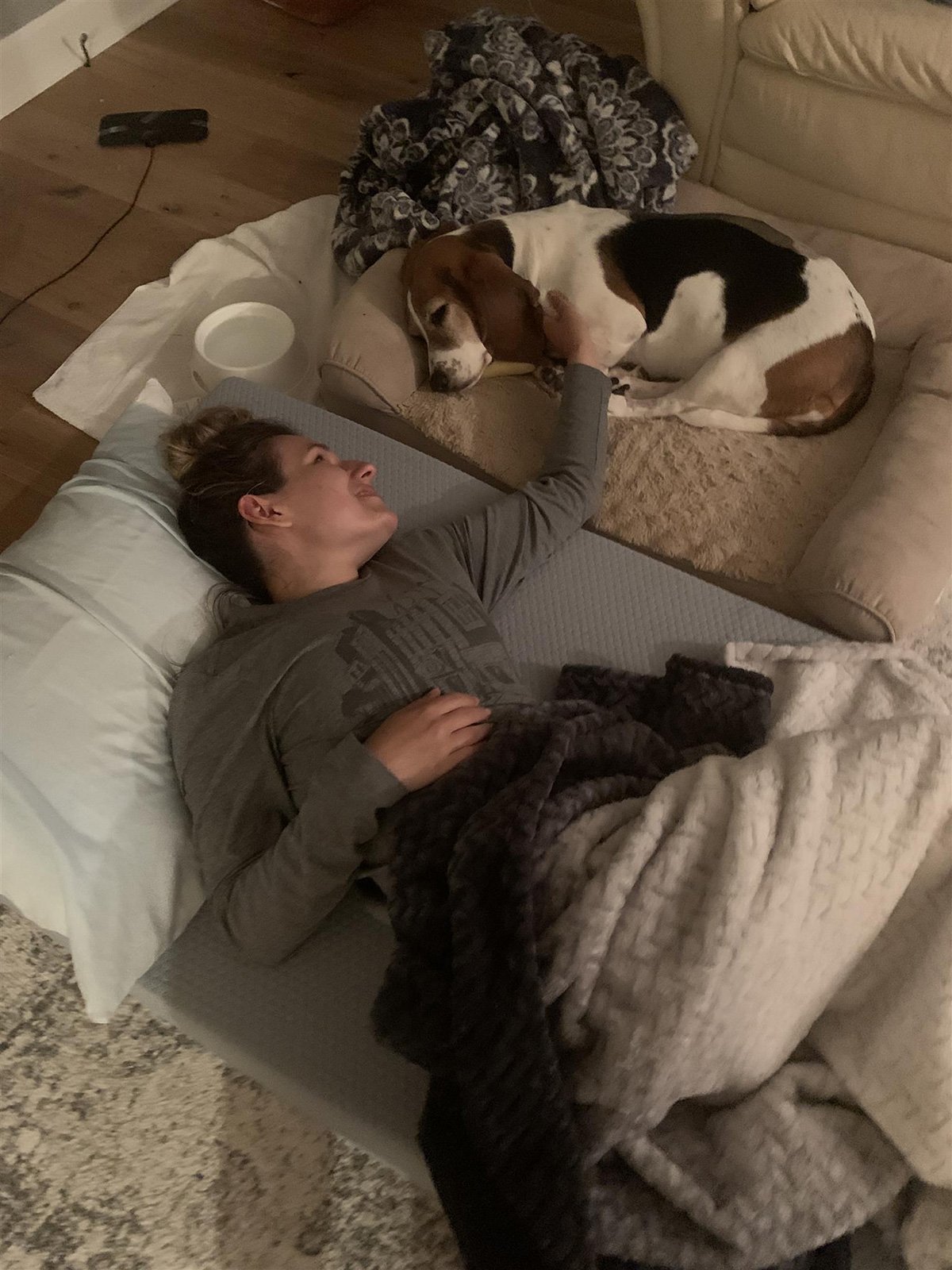Flynn is an eight-year-old basset hound who has conquered the internet with her sweetness and love for life, and although she's now living her best life in Pueblo, Colorado, with her mom, she's had to fight two of the strongest battles a dog can ever face.
Within a few years, Flynn was first diagnosed with paralysis, and then with cancer, and while everyone kept telling her owner to put her down, she persisted, and fought, with only her mom by her side.
And now, cure after cure, surgery after surgery, she has defied all odds and made it through.
Stephanie Shy, Flynn's mom, told Newsweek that people on social media, where she's been sharing Flynn's recovery journey, kept discouraging her, inciting her to give up on her dog: "They would tell me your dog is suffering you should put her down, like it's not worth it."

But she never lost faith, and it really paid off in the end: "I'm so glad I didn't listen to any of it because she's really happy now."
Shy recalls that in 2020, in the middle of the pandemic, Flynn was trying to jump on her bed as usual, when she fell and landed on her back.
"She seemed okay. She didn't cry, nothing, so we just went to bed. The next morning she was lethargic. It was really weird, so I took her [to the vet], and, long story short, they said that she had some injuries on her back," she said.
According to Shy, doctors initially didn't know what it was so she took her back home. It all became much clearer a few days later when she could no longer move. Within two days, Flynn became completely paralyzed, unable to move, and doctors suggested spinal surgery.
"So we did the spinal surgery, and it took a couple of days for her to come home. We then had to do a lot of rehab at home, because at the time everything was closed for the pandemic. So I helped her, and then a few weeks later she was able to walk again, not great, but she was walking on her own, and I didn't have to help her move."

What Is Paralysis In Dogs?
Paralysis affects the dog's ability to move and perform any kind of basic daily activities.
This is because, like for humans, a dog's ability to move depends on a complex communication system that involves nerves in the brain sending messages about the outer environment to the rest of the body, and when a dog is experiencing paralysis, it is often because communications between the spinal cord and the brain have been disrupted somehow.
Dr. Lauren Witter, senior veterinarian at Small Door Veterinary, told Newsweek that paralysis can be caused by many things including traumatic injuries, toxins, inflammation, strokes, infections, and tumors.
Moreover, its treatment depends on the underlying cause and may be supportive care, detoxification, medication or surgical intervention.
While it can affect any dog, some breeds are more prone to paralysis than others. For example, dogs that have long backs and are low to the ground, like dachshunds and basset hounds, are commonly affected by "ruptured vertebral disks" which put pressure on the spinal cord, a condition that is called intervertebral disc disease.
Another condition that can result in dog paralysis is called degenerative myelopathy (DM), a disease that attacks the nerves in the spines, usually of older dogs above seven years of age, and eventually leads to paralysis of the hind legs.
Breeds mostly affected by this disease include the Welsh Corgi, boxer, German shepherd, Chesapeake Bay retriever, and Irish setter.
'It Was So Big It Looked Like It Was Covering Half of Her Eyes'
As she was learning to walk, Flynn's life was quickly struck again by tragedy, this time by cancer. According to Shy, about one month into her rehabilitation, she noticed a bump under Flynn's eye getting bigger, and bigger.
She said: "The bump was always there, but it was small, I even had it tested and they said it shouldn't be anything to worry about. But then within a month, it got so big, it looked like it was covering half of her eyes. So they tested it and it came back as salivary gland cancer. The next month in July, she had to have another surgery to get that tumor removed."
Even though the surgery went well, and the doctors managed to remove most of Flynn's cancer, some was still there, but Shy wouldn't take any chances of losing her dog, so when the doctors told her Flynn would need to get her eye removed to make sure her cancer is all gone she didn't hesitate.
"They told me even before that surgery that there could be a possibility of her needing her eye taken out, and I said you know I would take that risk."
Within four months, Flynn had three surgeries, one for her spine in May and two for her cancer in July and August, and now, three years later, she is a happy cancer-free dog, who won the most important battles of her life.
"I thank God for that every single day. She is on CBD treatment now for her joints, and because of her age, she also just started taking liver medication. I rescued her when he was six months old, and I'm not sure what happened at that time. I think she was abused, because her legs they're just crooked."
What Is Salivary Gland Cancer?
According to Dr. Witter, salivary gland cancer is a neoplastic transformation of the cells that make up the salivary gland. It is overall very rare but when there is swelling or pathology in the salivary gland 30 percent of the time it is neoplastic or cancerous.
It's a cancer that can get locally large and also spread to other locations or metastasize, so it is quite life-threatening.
The treatment is often surgical but because of its location near very important vital structures of the head and neck complete surgical resection can be difficult. Radiation therapy can also be used.
The most common symptom of a salivary gland tumor is a painless swelling of the upper neck, ear base, or upper lip, like the bump Flynn experienced. Some dogs may also experience bad breath, known as halitosis, and drooling.
Other signs can include difficulty eating, for example, reluctance to chew, or trouble swallowing, while some pets may even eat less than usual or stop eating altogether, lose weight, and become lethargic.
They may start to sneeze, refuse to yawn or open their mouth, their bark can also change, and often the eye nearest to the swelling may protrude outwards.
The cost of these types of pet surgeries in the U.S. is quite high, and Shy estimates that each surgery was about $5,000, which she wouldn't have been able to cover hadn't it been for her GoFundMe, and all the kind strangers that decided to support Flynn and her battles.
"I did have dog insurance, and it covered a lot of it but there's still her ongoing medications. She also needs follow-up appointments, and I can take her and because I still have money from that."

Most people believe that dogs are our most loyal companions and that they acknowledge all the love we give them. Flynn certainly knows how much her mom has done for her, and according to Shy, she even paid her back when she was the one in need of love and attention.
She said: "Last year I had laparoscopy for my endometriosis, so I was just laying on the couch, and during that week I was laying on the couch Flynn never left my side except to go to the bathroom, but she was laying by me all of the time. She was just such a comfort and I truly believe that she did that because I was laying on the floor with her.
"When she was recovering, I never left her side, I never gave up on her and I truly believe that she wanted to pay me back in that way."
Uncommon Knowledge
Newsweek is committed to challenging conventional wisdom and finding connections in the search for common ground.
Newsweek is committed to challenging conventional wisdom and finding connections in the search for common ground.
About the writer
Maria Azzurra Volpe is a Newsweek Lifestyle Reporter based in London. Her focus is reporting on lifestyle and trends-related stories, ... Read more
To read how Newsweek uses AI as a newsroom tool, Click here.








